Related Research Articles
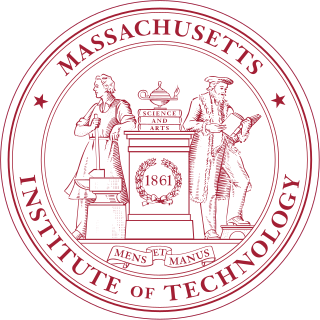
The Massachusetts Institute of Technology (MIT) is a private land-grant research university in Cambridge, Massachusetts. Established in 1861, MIT has played a significant role in the development of many areas of modern technology and science.

Leroy "Lee" Edward Hood is an American biologist who has served on the faculties at the California Institute of Technology (Caltech) and the University of Washington. Hood has developed ground-breaking scientific instruments which made possible major advances in the biological sciences and the medical sciences. These include the first gas phase protein sequencer (1982), for determining the sequence of amino acids in a given protein; a DNA synthesizer (1983), to synthesize short sections of DNA; a peptide synthesizer (1984), to combine amino acids into longer peptides and short proteins; the first automated DNA sequencer (1986), to identify the order of nucleotides in DNA; ink-jet oligonucleotide technology for synthesizing DNA and nanostring technology for analyzing single molecules of DNA and RNA.
Science and technology in Israel is one of the country's most developed sectors. Israel spent 4.3% of its gross domestic product (GDP) on civil research and development in 2015, the highest ratio in the world. In 2019, Israel was ranked the world's fifth most innovative country by the Bloomberg Innovation Index. It ranks thirteenth in the world for scientific output as measured by the number of scientific publications per million citizens. In 2014, Israel's share of scientific articles published worldwide (0.9%) was nine times higher than its share of the global population (0.1%).
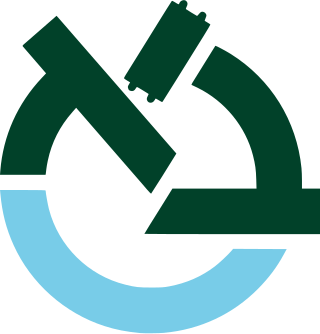
Bar-Ilan University is a public research university in the Tel Aviv District city of Ramat Gan, Israel. Established in 1955, Bar Ilan is Israel's second-largest academic institution. It has about 20,000 students and 1,350 faculty members.

Gary K. Michelson is an American orthopedic surgeon, medical inventor, and billionaire philanthropist.
James Heywood is an American MIT mechanical engineer who founded with his family the ALS Therapy Development Institute when his younger brother Stephen Heywood was diagnosed with amyotrophic lateral sclerosis (ALS) in December 1998. He is currently a director at AOBiome, as well as founder and CEO of PatientsLikeMe.
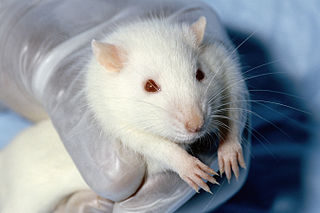
The Foundation for Biomedical Research (FBR) is an American nonprofit organization, 501(c)(3), located in Washington, DC. Established in 1981, the organization is dedicated to informing the news media, teachers, and other groups about the need for lab animals in medical and scientific research. The organization, together with its partner, the National Association for Biomedical Research (NABR), argues that promoting animal research leads to improved health for both humans and animals.

The ALS Therapy Development Institute is a non-profit biotechnology research organization focused on finding treatments for amyotrophic lateral sclerosis (ALS). With a staff including more than 30 scientists, it operates a research and development program centered on ALS.
InnoCentive is an open innovation and crowdsourcing company with its worldwide headquarters in Waltham, MA and their EMEA headquarters in London, UK. They enable organizations to put their unsolved problems and unmet needs, which are framed as ‘Challenges’, out to the crowd to address. In the case of InnoCentive, the crowd can either be external or internal. Awards, typically monetary, are given for submissions that meet the requirements set out in the Challenge description. The average award amount for a Challenge is $20,000 but some offer awards of over $100,000. To date, InnoCentive have run over 2,000 external Challenges and over 1,000 internal Challenges, awarding over $20 million in the process.
The "war on cancer" is the effort to find a cure for cancer by increased research to improve the understanding of cancer biology and the development of more effective cancer treatments, such as targeted drug therapies. The aim of such efforts is to eradicate cancer as a major cause of death. The signing of the National Cancer Act of 1971 by United States president Richard Nixon is generally viewed as the beginning of this effort, though it was not described as a "war" in the legislation itself.

Françoise Barré-Sinoussi is a French virologist and Director of the Regulation of Retroviral Infections Division and Professor at the Institut Pasteur in Paris, France. Born in Paris, France, Barré-Sinoussi performed some of the fundamental work in the identification of the human immunodeficiency virus (HIV) as the cause of AIDS. In 2008, Barré-Sinoussi was awarded the Nobel Prize in Physiology or Medicine, together with her former mentor, Luc Montagnier, for their discovery of HIV. She mandatorily retired from active research on August 31, 2015 and fully retired by some time in 2017.
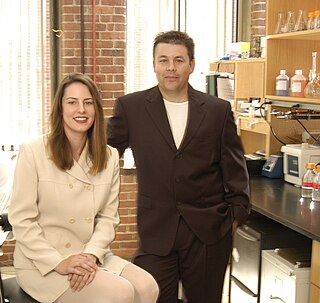
Sean Forrester Scott was a self-educated disease activist and researcher, filmmaker, innovator, entrepreneur and until the time of his death, the president of the ALS Therapy Development Institute, the world's largest amyotrophic lateral sclerosis research center. Scott himself was diagnosed with ALS in 2008 at the age of 38.
There exist a number of competitions and prizes to reward distinguished contributions and to encourage developments in biotechnology.
Electrical impedance myography, or EIM, is a non-invasive technique for the assessment of muscle health that is based on the measurement of the electrical impedance characteristics of individual muscles or groups of muscles. The technique has been used for the purpose of evaluating neuromuscular diseases both for their diagnosis and for their ongoing assessment of progression or with therapeutic intervention. Muscle composition and microscopic structure change with disease, and EIM measures alterations in impedance that occur as a result of disease pathology. EIM has been specifically recognized for its potential as an ALS biomarker by Prize4Life, a 501(c)(3) nonprofit organization dedicated to accelerating the discovery of treatments and cures for ALS. The $1M ALS Biomarker Challenge focused on identifying a biomarker precise and reliable enough to cut Phase II drug trials in half. The prize was awarded to Dr. Seward Rutkove, chief, Division of Neuromuscular Disease, in the Department of Neurology at Beth Israel Deaconess Medical Center and Professor of Neurology at Harvard Medical School, for his work in developing the technique of EIM and its specific application to ALS. It is hoped that EIM as a biomarker will result in the more rapid and efficient identification of new treatments for ALS. EIM has shown sensitivity to disease status in a variety of neuromuscular conditions, including radiculopathy, inflammatory myopathy, Duchenne muscular dystrophy, and spinal muscular atrophy.

Gladstone Institutes is an independent, non-profit biomedical research organization whose focus is to better understand, prevent, treat and cure cardiovascular, viral and neurological conditions such as heart failure, HIV/AIDS and Alzheimer's disease. Its researchers study these diseases using techniques of basic and translational science. Another focus at Gladstone is building on the development of induced pluripotent stem cell technology by one of its investigators, 2012 Nobel Laureate Shinya Yamanaka, to improve drug discovery, personalized medicine and tissue regeneration.
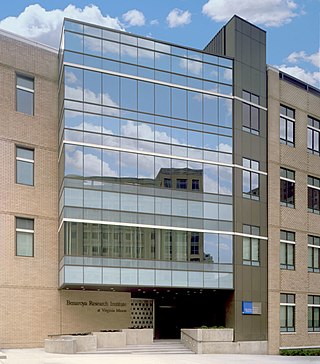
Benaroya Research Institute (BRI) is a Seattle, Washington non-profit organization that conducts medical research on many diseases and immune disorders, including autoimmune disease. It is affiliated with Virginia Mason Health System, and is located on the campus of Virginia Mason Medical Center.

The Shake It Up Australia Foundation (SIUAF) is an Australian non-for-profit foundation founded in 2011 by Clyde and Greg Campbell. It is partnered with the Michael J. Fox Foundation (MJFF) to achieve the foundations primary aims of “promoting and funding Parkinson’s disease research in Australia to slow, stop and cure the disease”. Together MJFF and SIUAF are the largest non-government funders of Parkinson's research across multiple institutes in Australia. Since its founding, the foundation has co-founded 38 Parkinson's research projects across 12 institutes to the value of over $10.8 million. The foundation's funding model ensures that 100% of proceeds goes towards Parkinson's research in Australia. This is possible due to the founding directors covering all overhead costs and expenses. In January 2019, Shake It Up are one of the partner organisation in the Australian Parkinson's Mission which was awarded a $30 million-dollar grant to test repurposed drugs in clinical trials.
Dennis J. Selkoe is an American physician (neurologist) known for his research into the molecular basis of Alzheimer's disease. In 1985 he became Co-Director of the Center for Neurological Diseases and from 1990, Vincent and Stella Coates Professor of Neurological Diseases at Harvard Medical School. He is also a Fellow of the AAAS and a member of the National Academy of Medicine.
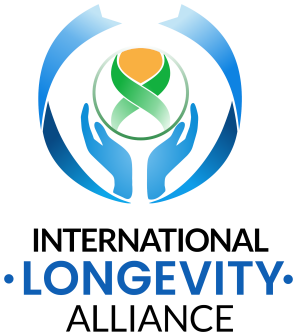
The International Longevity Alliance (ILA) is an international nonprofit organization that is a platform for interaction between regional organizations that support anti-aging technologies, usually at the administrative and popularization levels. The declared objectives of the organization are to establish regional organizations' interaction and collaboration, to popularize the idea of the need to combat the aging process as a negative but treatable medical condition of the body, and to provide support for scientific research in all possible ways and at all possible levels around the world.
References
- 1 2 $1 Million to Inventor of Tracker for A.L.S., The New York Times, February 8, 2011
- ↑ "Avi Kremeunder of Prize4Life, Joins The ALS Association Team". ALSA.org. Retrieved 2018-11-29.